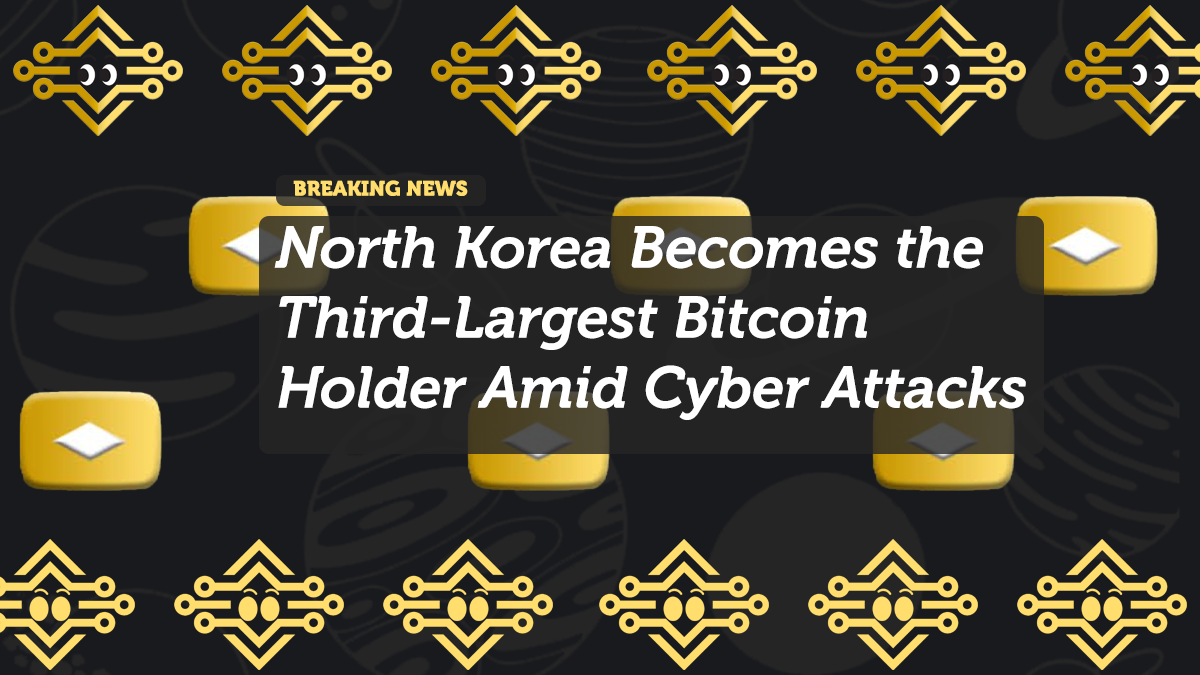
North Korea Becomes the Third-Largest Bitcoin Holder Amid Cyber Attacks
North Korea has reportedly become the third-largest holder of Bitcoin globally, following the United States and the United Kingdom. This accumulation is largely linked to cyber-hacking activities by the Lazarus Group, a state-sponsored hacking collective that has allegedly stolen over 13,580 BTC, worth approximately £886 million.
These funds are believed to support North Korea’s nuclear and missile programs, raising concerns among global governments about the use of cryptocurrencies for illicit activities.
At the same time, President Trump has proposed a strategic Bitcoin reserve, aiming to capitalize on Bitcoin’s fixed supply and security features.
This raises critical questions:
- How did North Korea amass such a large Bitcoin reserve?
- What are the geopolitical implications of a state-backed cyber-hacking operation using crypto?
- How are global powers responding to this growing cryptocurrency-fueled security threat?
How Did North Korea Accumulate Bitcoin?
North Korea’s Bitcoin reserves are largely attributed to cyber-hacking and illicit financial activities, rather than mining or legitimate investment.
1. Cyber-Hacking Operations
The Lazarus Group, a North Korean state-sponsored hacking collective, has been linked to numerous high-profile crypto heists, including:
- The Axie Infinity Ronin Bridge hack, where hackers stole $620 million in Ethereum and USDC.
- The Horizon Bridge hack, resulting in losses of $100 million.
- Multiple attacks on crypto exchanges and DeFi protocols, siphoning millions in Bitcoin.
Blockchain forensic firms, including Chainalysis, have confirmed that North Korean hackers routinely launder stolen funds through crypto mixers and decentralized platforms.
2. Use of Crypto Mixers and Laundering Techniques
To evade sanctions, North Korea has been known to use crypto tumblers and privacy protocols to obscure the origins of stolen funds.
Common tactics include:
- Tornado Cash and Blender.io – Crypto mixers used to mask transaction trails.
- Decentralized finance platforms – Exploiting unregulated DeFi protocols to swap stolen assets.
- Phishing and social engineering – Hacking into exchange wallets by impersonating software developers and crypto firms.
Despite efforts by global law enforcement, North Korea has managed to move and convert stolen funds into cash, often through overseas money-laundering networks.
Why Is North Korea Hoarding Bitcoin?
Unlike fiat currencies, Bitcoin is censorship-resistant and difficult to confiscate, making it an attractive asset for regimes facing strict international sanctions.
1. Funding Nuclear and Missile Programs
Reports suggest that North Korea is using stolen cryptocurrency to fund its weapons programs. The United Nations has repeatedly warned that crypto heists are a major source of revenue for North Korea’s ballistic missile development.
2. Circumventing Economic Sanctions
North Korea is cut off from the global financial system, making Bitcoin an ideal tool for international transactions.
With Bitcoin, North Korea can:
- Pay for materials and weapons technology without relying on traditional banking networks.
- Bypass sanctions imposed by the U.S. and the European Union.
- Store and move wealth discreetly without government oversight.
This has intensified global efforts to regulate cryptocurrency and prevent it from being exploited by sanctioned entities.
How Are Global Governments Responding?
The growing use of cryptocurrency in illicit activities has led to increased global scrutiny and calls for stronger regulations.
1. The U.S. Response: A Strategic Bitcoin Reserve
In response to North Korea’s increasing Bitcoin holdings, President Trump has proposed a strategic Bitcoin reserve, positioning the U.S. as a major player in digital assets.
This initiative would:
- Ensure the U.S. government holds Bitcoin as a national reserve asset.
- Leverage Bitcoin’s fixed supply as a hedge against inflation and geopolitical risks.
- Prevent hostile actors from gaining dominance in the digital currency space.
While details of this reserve are still unclear, Trump’s pro-crypto stance marks a significant shift in how governments approach digital assets.
2. Crackdowns on Crypto Mixers and Laundering Networks
Regulators have intensified efforts to track and seize illicit crypto funds linked to North Korea.
Recent actions include:
- Sanctions against Tornado Cash and Blender.io, preventing North Korea from using these services to launder funds.
- Increased blockchain analytics efforts, allowing agencies to trace stolen crypto through transaction monitoring.
- Tighter regulations on exchanges, forcing platforms to implement stricter anti-money laundering measures.
However, North Korea continues to evolve its tactics, posing an ongoing challenge for global law enforcement.
What This Means for Bitcoin and the Crypto Market
The involvement of nation-states in cryptocurrency accumulation is reshaping the global narrative around digital assets.
1. National Security Concerns
Governments are now treating crypto-related cybercrime as a national security threat, leading to increased enforcement and oversight.
Expect to see:
- Stronger regulations targeting illicit crypto transactions.
- Tighter KYC and AML (Anti-Money Laundering) rules for crypto exchanges.
- More aggressive legal actions against crypto mixers and privacy tools.
2. Bitcoin’s Growing Role in Geopolitics
Bitcoin is no longer just a speculative asset—it is becoming a strategic financial tool in global power struggles.
- Countries like El Salvador have embraced Bitcoin as a national currency.
- The U.S. is considering a Bitcoin reserve to strengthen economic security.
- Rogue states like North Korea are using Bitcoin to evade sanctions and fund military operations.
As Bitcoin’s influence grows, governments will need to adapt their policies to balance innovation with security risks.
Final Thoughts: Is Bitcoin Becoming a Weaponized Asset?
North Korea’s massive Bitcoin holdings highlight the dual nature of cryptocurrency. While Bitcoin represents financial freedom and decentralization, it is also being exploited for illicit activities and cyber warfare.
The question now is:
- Will global regulations be able to curb the misuse of Bitcoin?
- Can the U.S. leverage a strategic Bitcoin reserve to counter rogue actors?
- How will the crypto industry adapt to increasing government intervention?
The coming years will be crucial in determining Bitcoin’s role in global finance and security.
What do you think? Should governments regulate Bitcoin more aggressively, or does this risk undermining the core principles of decentralization?
Let’s discuss.










